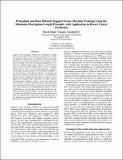Principled and data efficient support vector machine training using the minimum description length principle, with application in breast cancer
Abstract
Support vector machines (SVMs) are established as highly successful classifiers in a broad range of applications, including numerous medical ones. Nevertheless, their current employment is restricted by a limitation in the manner in which they are trained, most often the training-validation-test or k-fold cross-validation approaches, which are wasteful both in terms of the use of the available data as well as computational resources. This is a particularly important consideration in many medical problems, in which data availability is low (be it because of the inherent difficulty in obtaining sufficient data, or because of practical reasons, e.g. pertaining to privacy and data sharing). In this paper we propose a novel approach to training SVMs which does not suffer from the aforementioned limitation, which is at the same time much more rigorous in nature, being built upon solid information theoretic grounds. Specifically, we show how the training process, that is the process of hyperparameter inference, can be formulated as a search for the optimal model under the minimum description length (MDL) criterion, allowing for theory rather than empiricism driven selection and removing the need for validation data. The effectiveness and superiority of our approach are demonstrated on the Wisconsin Diagnostic Breast Cancer Data Set.
Citation
Singh , H & Arandelovic , O 2022 , ' Principled and data efficient support vector machine training using the minimum description length principle, with application in breast cancer ' , Paper presented at AAAI 2022 Workshop , 1/03/22 - 1/03/22 . https://doi.org/10.1109/icassp43922.2022.9747649 conference
Status
Peer reviewed
Type
Conference paper
Collections
Items in the St Andrews Research Repository are protected by copyright, with all rights reserved, unless otherwise indicated.

